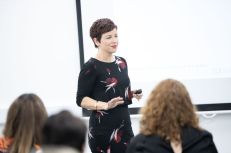Last Wednesday Nov 6 2019, I had the pleasure of contributing at “Workshop Wednesday”, a joint initiative between Network Cork and Cork Institute of Technology (C.I.T.). My workshop, entitled “Focus on Priorities” challenged attendees to reflect on their own priorities as well as equipping them with the tools to allocate their time and energy accordingly. I have captured the essence of the talk in the following blog. Enjoy!
There’s a saying: “How we spend our days is how we spend our lives”. Do you feel like you spend your days running from ‘pillar to post’, characterised by meeting other peoples’ agendas and goals? Perhaps you feel hijacked by the school calendar? Do you ever find yourself saying:
- “If only there were more hours in the day…”
- “I need to split myself in two to get around to all of that!”
- “I didn’t have the time to…!”
- “Can’t you see how busy I am?”
In a world where we are expected to approach our days like an endless iron man competition, our ability to evaluate our activities and behaviours in the context of what we want to achieve, is an important exercise to ensure that we keep ourselves on track. Therefore, having awareness and being intentional about identifying our priorities is critical.
Why Prioritize? Our ability to prioritize, or choosing how we wish to spend our time and energy ensures that we can make the most of our time, our talent and opportunities. However, by NOT choosing (or choosing badly!), we can bog ourselves down in time- depleting, low – yield projects that prevent us from moving forward.
The good news is that time is elastic and it will stretch to accommodate what we choose to put into it. Here are the tips from Change Grow Succeed to help you evaluate your time ensuring that you are performing and getting results in the areas of your life that you value:
- Tip #1: Look In
Ask yourself: are you performing in the areas of your life that you value? How would you score out of 10 your satisfaction with your current role, your key relationships, how often you have fun and creative, your social life? In what areas of your life do you wish to make progress? Be as specific as you can.
- Tip #2: Audit your time
Analyse your calendar for 3 days and note your appointments, meetings, admin, downtime and other activities and evaluate their importance in the context of what it is you want to achieve. Look at the duration of each task and your energy levels. Ask yourself, what could I do more of or less of to enable me perform or get results? Allocate your time in accordance with what’s important to you.
- Tip #3: Plan your week
Organise and execute around balanced priorities. Laura Vandercamp a time management specialist and TED talk speaker* encourages us to plan on a Friday afternoon for the week ahead as it tends to be a “low cost opportunity time”, and aim to populate 3 columns: “Work, Relationships, Self” therefore reminding us that there should be something in all 3 columns.
- Tip #4: Use a Time Management Tool
There are many tools available in the public domain. A favourite of mine because it yields results is called the Priority Matrix. At Change Grow Succeed, we share this tool during our workshops and often through coaching. Leveraging the Eisenhower Matrix, this tool challenges us to think about ‘Impact’ (of the task) and ‘Effort’ (from our behalf) rather than Urgent and Important (which, lets face it, everything is). It uses four quadrents, each with a directive ‘do first’, ‘do next’ etc. We list our activities, score them and subsequently plot them in each quadrant.
- Tip #5: Learn to say no
Once you have clarity on your priorities, placing boundaries around your own time and energy becomes easier and saying no pleasantly & unapologetically (or even “not now”!) to the things that are less important to you will become second nature. I have previously written on “The Disease to Please”, click here for more details.
In a world where change is constant, our ability to be nimble to meet lifes’ demands is important. At Change Grow Succeed, we are passionate about helping people to perform and succeed in the areas of their life that they value. Get in touch with us today to see how we can support you in living the life you want with the time that you have!
Gillian McGrath is Cork based Life and Business Coach, Public Speaker and Facilitator. For more information go to http://www.changegrowsucceed.com








